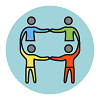Transcript for the Felicity Charles and Laura Seamons video in the annual report for 2019-20
[Title card] Hammersmith and Fulham Safeguarding Report 2020.
Felicity: I think one of the learnings that we've had as part of the Community MARAC and one of the unique aspects to the types of cases that we're dealing with, is the fact that these are cases which are often quite entrenched or involve individuals where there may be very complex needs or significant experiences of multiple disadvantage. And so there are not always immediate solutions to these cases.
[On screen text] Community MARAC - A multiagency group that responds to high risk cases of antisocial behaviour and hate crime.
Laura: The perpetrator might actually be a victim in themselves. So that might be because they have mental health concerns or because they're being coerced by another individual. This might mean that we have to resolve the problems affecting the perpetrator in order for the risk to the victim to be reduced.
[Title card] How significant is mental health in your work?
Felicity: Mental health is a really significant part of the Community MARAC and the cases that we hear. 51 per cent of victims have mental health concerns and 64 per cent of perpetrators. We know antisocial behaviour and mental health may be linked, that we know that the risk of the antisocial behaviour may be increasing because of a person's deteriorating mental health. That's why it's really important that mental health is a key partner in the Community MARAC.
[On screen text] Figures from 51 total cases of victims total, and 52 cases of perpetrators, where mental health condition was known 2019 to 2020.
Laura: To try and support those involved, we work with the West London Mental Health Trust who are on the panel, and they are a really essential member in trying to ensure that people are offered the support that they need. They can try and work with the individuals, working with their GP's to try and ensure that they do access the mental health service and realise that they do actually need additional support.
[Title card] What are your goals for the next year?
Felicity: One aspect that we would really like to build on as part of the Community MARAC process, is how to enhance the victim's voice in the process.
Laura: We also want to work with mental health organisations and disability organisations because we've seen that so many cases that are referred to us, do have mental health concerns. One example that we have had of this, is a referral that we were given from a sheltered housing officer concerning an elderly gentleman that had shown a decline in his memory.
He was being coerced by two known rough sleepers in the borough. He was allowing them access into the home and giving them money because he believed that they were his carers and that they were supporting him. They were found to be doing Class A drugs and were sleeping in communal areas, which was obviously having a large impact on other residents living within the sheltered housing block. And we want to make sure that those victims or perpetrators are fully supported and that they can get the help that they might need in those areas.
[Title card] What is the most rewarding aspect of your job?
Felicity: I think one of the most important and rewarding aspects of what we do is knowing that we genuinely make a difference to the lives of the people that we support through the Community MARAC process, and that might be ensuring that they're in appropriate accommodation. It might be through a reduction in the antisocial behaviour, improvement in their wellbeing or linking people in with support that they have desperately needed and not been able to get.
Laura: The Community MARAC has heard 49 cases this year. And we found that in 89 per cent of cases the referrer thought that the Community MARAC was helpful in eliminating the antisocial behaviour which is positive to hear.
[On screen text] Figures from a total of 83 cases heard in 2019 to 2020.
[Title card] How has Covid-19 affected your work this year?
Laura: A lot of the antisocial behaviour cases are identified by frontline workers, so it affects the speed in which we can have an impact on eliminating the antisocial behaviour. We also had to move the Community MARAC online. This had a number of challenges in initially setting it up. Ensuring that we were still covering safe practices and making sure that everyone had access to the meeting.
However, although this had challenges to start with, we've actually seen that we've seen an increase in number of attendance because it's so much easier to attend to the meeting. So even when things go back to normal, I think we'll maintain some of the virtual aspects of the Community MARAC.
[Title card] What's your message for the residents of Hammersmith and Fulham?
Felicity: The most important thing to say to residents is that we are here to support you and to help you if you are experiencing antisocial behaviour. This isn't something that you should have to experience or live with and our Community MARAC and our community safety teams and the partners that we work with, are here to support you and provide you and your families with the support that might be needed.
[Title card] To get in touch with the Community MARAC, please call on 020 8753 2693 or email at communitymarac@lbhf.gov.uk
